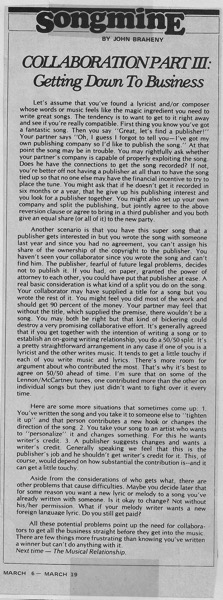A John Braheny Songmine column from the archives…

Accession Number: C000000137-028-002 Document/Digital File, “Songmine: Collaboration Part II: Meeting Your Match”, OCR converted text under same Accession Number
(Digitally converted text. Some errors may occur)
COLLABORATION PART III: Getting Down To Business by John Braheny
Let’s assume that you’ve found a lyricist and/or composer whose words or music feels like the magic ingredient you need to write great songs. The tendency is to want to get to it right away and see if you’re really compatible. First thing you know you’ve got a fantastic song. Then you say “Great, let’s find a publisher!” Your partner says “Oh, I guess I forgot to tell you— I’ve got my own publishing company so I’d like to publish the song.” At that point the song may be in trouble. You may rightfully ask whether your partner’s company is capable of properly exploiting the song. Does he have the connections to get the song recorded? If not, you’re better off not having a publisher at all than to have the song tied up so that no one else may have the financial incentive to try to place the tune. You might ask that if he doesn’t get it recorded in six months or a year, that he give up his publishing interest and you look for a publisher together. You might also set up your own company and split the publishing, but jointly agree to the above reversion clause or agree to bring in a third publisher and you both give an equal share (or all of it) to the new party.
Another scenario is that you have this super song that a publisher gets interested in but you wrote the song with someone last year and since you had no agreement, you can’t assign his share of the ownership of the copyright to the publisher. You haven’t seen your collaborator since you wrote the song and can’t find him. The publisher, fearful of future legal problems, decides not to publish it. If you had, on paper, granted the power of attorney to each other, you could have put that publisher at ease. A real basic consideration is what kind of a split you do on the song. Your collaborator may have supplied a title for a song but you wrote the rest of it. You might feel you did most of the work and should get 90 percent of the money. Your partner may feel that without the title, which supplied the premise, there wouldn’t be a song. You may both be right but that kind of bickering could destroy a very promising collaborative effort. It’s generally agreed that if you get together with the intention of writing a song or to establish an on-going writing relationship, you do a 50/50 split. It’s a pretty straightforward arrangement in any case if one of you is a lyricist and the other writes music. It tends to get a little touchy if each of you write music and lyrics. There’s more room for argument about who contributed the most. That’s why it’s best to agree on 50/50 ahead of time. I’m sure that on some of the Lennon/McCartney tunes, one contributed more than the other on individual songs but they just didn’t want to fight over it every time.
Here are some more situations that sometimes come up: 1. You’ve written the song and you take it to someone else to “tighten it up” and that person contributes a new hook or changes the direction of the song. 2. You take your song to an artist who wants to “personalize” it and changes something. For this he wants writer’s credit. 3. A publisher suggests changes and wants a writer’s credit. Generally speaking we feel that this is the publisher’s job and he shouldn’t get writer’s credit for it. This, of course, would depend on how substantial the contribution is–and it can get a little touchy.
Aside from the considerations of who gets what, there are other problems that cause difficulties. Maybe you decide later that for some reason you want a new lyric or melody to a song you’ve already written with someone. Is it okay to change? Not without his/her permission. What if your melody writer wants a new foreign language lyric. Do you still get paid?
All these potential problems point up the need for collaborators to get all the business straight before they get into the music. There are few things more frustrating than knowing you’ve written a winner but can’t do anything with it. Next time — The Musical Relationship.
MARCH 6 — MARCH 19
See all previous entries in the Songmine Series
About Songmine and Music Connection Magazine:
John Braheny met Eric Bettelli and Michael Dolan right before they were going to publish Music Connection magazine. Eric and Michael wanted to get their publication out to as many songwriters as they could. They had already heard of the LA Songwriters Showcase, and of John and his partner, Len Chandler. John’s goal was to advertise the schedule of guest speakers and performers at the weekly Showcase… so they made a deal.
They published John’s Songmine column (he had never before written a magazine article!) in their very first edition, in November 1977. Trading out the column for advertising, this arrangement continued for many years. Plus, Eric and Michael came to the Showcase each week and distributed free copies to the songwriters!
Those articles became so popular that (book agent and editor) Ronny Schiff offered John’s articles to F&W Media, where they became the backbone of John’s textbook, The Craft and Business of Songwriting. As a follow-up, Dan Kimpel (author, songwriter, teacher), who had also worked at LASS, took on the Songwriting column at Music Connection magazine which continues to this day! You can subscribe to get either hard copies or online.
No comments yet.